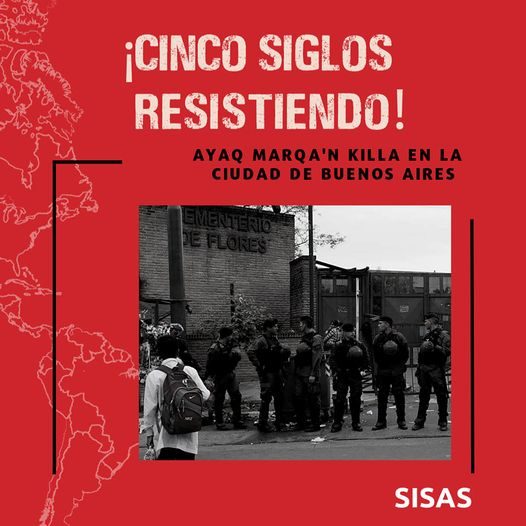Latin American Summary, November 2, 2022.
Every year, on the first two days of November, the Andean Peoples carry out the Ayaq Marq’an Killa Ceremony (Day of the Dead). In those moments, those who are not in this plane visit us, we make contact with our ancestors.
The Ayaq Marq’an Killa socially shares the original spirituality from the Quechua Aymara Andean Amazon Nations and what is represented in the commemoration of our ancestors, understood as an ancient tradition, which takes place before the Conquest. Spirituality is practiced throughout the Abya Yala, including even the Autonomous City of Buenos Aires.
It is the moment that we meet again in the cemeteries with the ajayus (souls) with our deceased, whom we receive with joy, food, offerings and music. Offerings are made with different Andean symbols to honor the three levels-spaces of life that are the Janan Pacha (World Above); the Kay Pacha (The Here and Now, the Underworld) and the Ukhu Pacha (Underworld).
This ancestral practice is guaranteed by international and national regulations, the Argentine State has ratified International Instruments in which the Rights of Indigenous Peoples and more precisely the ethnic and cultural Pre-existence, Cosmic, Spiritual and Cultural traditions are protected.
In this sense, due to the federal clauses within the National Constitution, the provincial states and the Autonomous City of Buenos Aires cannot violate norms of superior hierarchy, therefore, the latter has sanctioned its own regulation on the matter and, in its turn, regulates other private entities.
The constitutional reform of the year 1994, introduced in its article 75 paragraph 17 and paragraph 19 a pluralist and multicultural paradigm, recognizing the cultural and ethnic diversity of the State, as well as the pre-existence of indigenous peoples.
In turn, article 75 paragraph 22 introduced international human rights instruments to the legal system that guarantee different human rights in general.
In this sense, Convention 169 of the International Labor Organization (ILO), on Indigenous and Tribal Peoples in Independent Countries, ratified by the State, recognizes the aspirations of pre-existing peoples to assume control of their own institutions and ways of life and of their economic development and to maintain and strengthen their identities, languages and religions, within the framework of the States in which they live.
However, the full human right to cultural identity is still not fully realized in certain places.
In the City of Buenos Aires there is in its constitution article 32 that guarantees cultural rights. On the other hand, Law No. 2,263 promotes the preservation of the culture of the Original Peoples, recognizes their own forms of organization, based on full respect for their cultural and spiritual values and their own ways of life, and their worldview. .
In turn, the Legislature of Buenos Aires promulgated Law 4799 of the year 2014, which establishes a Legal Regime in mortuary matters in Cemeteries, which in its article 9 authorizes “all manifestations and expressions of native peoples of a community ceremonial nature, in relation to their deceased, on November 1 and 2 of each year”, still in the spaces where our ancestors rest this is inapplicable.
Today a specific bill is in the Buenos Aires legislature, which allows, firstly, to fully guarantee this ancestral practice and, secondly, those of us who practice it can do it without fear of missing our jobs and losing them, and finally obliges the executive power to organize dissemination campaigns.
By Paula Alvarado Mamani – SISAS
Photo by Reigned Ortega
Original towns. Ayaq Marq’an Killa in the City of Buenos Aires – Latin American Summary

